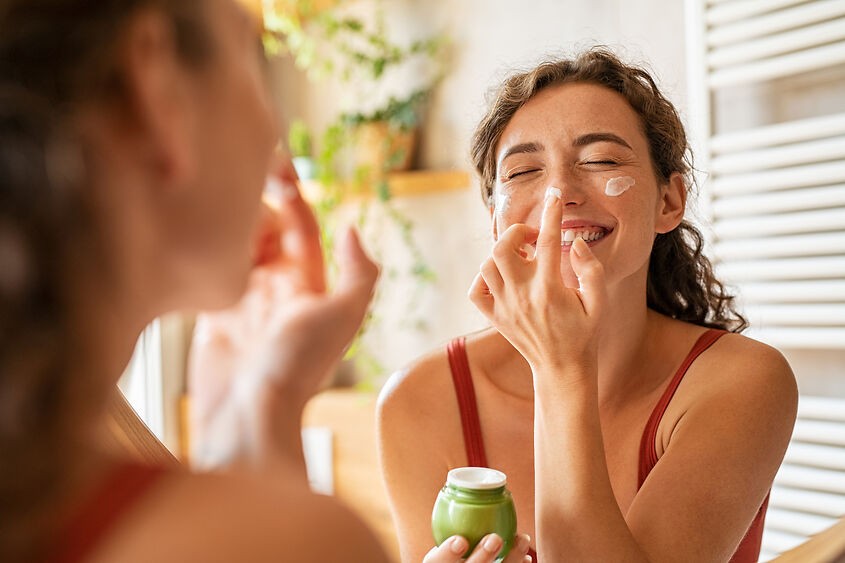As the seasons change and the weather warms up, it's natural to reassess your skincare routine. However, amidst the blooming flowers and chirping birds of spring, it's important not to fall victim to misleading skincare myths that could potentially harm your skin. So, let's separate fact from fiction as we strive for healthier, happier skin this April.
 Photo Credit: Courtesy of Ground Picture/Shutterstock
Photo Credit: Courtesy of Ground Picture/Shutterstock
Myth: Skincare Doesn't Expire
Fact: All products expire—even skincare and Twinkies.
Similar to consumable goods, skincare products come with a defined shelf life or 'use-by' date to ensure both their efficacy and safety. As time passes, exposure to air, light, water, or microbial factors causes the breakdown of ingredients within these products. Utilizing expired skincare items can lead to various issues such as irritation, infections, allergic responses, or breakouts.
Look for the Period After Opening (PAO) symbol on the packaging to determine how long a product remains safe after opening. It's essential to store skincare products in cool, dark places and avoid introducing bacteria by avoiding direct contact with your fingers, such as dipping them into jars. Remember that certain ingredients, such as Vitamin C (ascorbic acid), Retinol, and Benzoyl peroxide, are particularly sensitive to light or air, so always adhere to the manufacturer's recommended storage instructions.
Myth: Sunscreen Is Only Necessary in Summer
Fact: You need sunscreen every day of the year.
We apply SPF to safeguard our skin against two types of UV radiation: UVA and UVB. Picture UVA rays as aging rays, while UVB rays are burning ones. UVA rays maintain relatively consistent intensity throughout the year, penetrating cloud cover and even glass. Additionally, snow and ice can reflect up to 80% of UV rays in winter, amplifying exposure from all angles—not just from above.
Broad Spectrum SPF shields our skin from UVA and UVB rays, preventing premature aging, skin cancer, and painful burns. It's important to note that all exposure to UV radiation accumulates over your lifetime, underscoring the necessity for consistent protection every day of the year to prevent long-term damage.
While your SPF level can remain constant year-round, consider adjusting formulas based on the season. Opt for lightweight, water-resistant options during summer and choose richer, more moisturizing sunscreen in winter to combat dry, flaky skin.
Myth: Oily Skin Doesn't Need Moisturizer
Fact: Skipping moisturizer can exacerbate oil production.
Sebum, the natural oil produced by the skin, contains wax esters, squalene, free fatty acids, and triglycerides, serving as an occlusive that forms a protective layer on the skin. This barrier helps reduce moisture loss and maintain hydration levels. However, while sebum plays a role in maintaining skin hydration by preventing moisture from escaping, it does not actively hydrate the skin.
Unlike sebum, moisturizers typically contain a combination of ingredients, including humectants like glycerin or hyaluronic acid. These humectants attract water into the skin, keeping it hydrated, flexible, and plump. When water draws into the skin, the natural oils produced by our skin have nothing to lock in. As a result, the skin may feel dehydrated, leading to overcompensation by producing more oil.
Opt for a lightweight, oil-free moisturizer that won't clog pores but will provide essential hydration to balance the skin's natural oil production.
 Photo Credit: Courtesy of Shutterstock
Photo Credit: Courtesy of Shutterstock
Myth: Exfoliating Every Day Is Beneficial
Fact: Excessive exfoliation is bad for your skin.
Over-exfoliation can irritate the skin by stripping it of its natural oils, disrupting the skin's barrier, and increasing sensitivity. Limit exfoliating to two to three times per week, and choose an exfoliant compatible with your skin type. Chemical exfoliants tend to produce more uniform results, which means if you're using a scrub more and more often because you feel like it's just not doing the job, switching to Alpha-Hydroxy Acids (AHAs) or Beta-Hydroxy Acids (BHAs) might be beneficial.
When incorporating exfoliants into your routine, remember the importance of starting slowly. Begin with a low concentration, conduct patch tests, and gradually integrate the product into your skincare regimen. Additionally, certain active ingredients, such as Retinol, can accelerate skin cell turnover, potentially leading to over-exfoliation and irritation.
Lastly, remember to apply sunscreen. Exfoliation can heighten your skin's sensitivity to sunlight, making proper sun protection essential for maintaining skin health.
Myth: Natural Ingredients Are Always Better
Fact: While products boasting botanical extracts or plant-derived oils may seem inherently safer or more effective, the reality is more nuanced.
While natural ingredients may vary considerably in composition and effectiveness due to factors such as growing conditions, harvesting methods, or processing techniques, synthetic ingredients provide a reliable solution. With standardized production processes, they offer consistency, stability, sustainability, and safety.
Synthetic ingredients used in cosmetic and skincare products undergo rigorous laboratory testing and clinical trials to ensure safety and efficacy, complying with consumer safety regulations. It's essential to understand that the safety of any ingredient, whether natural or synthetic, depends on factors such as concentration, purity, and individual sensitivities.
Just one more important note: Don't underestimate the importance of regular skin checks. Make it a habit to see your dermatologist annually to screen for any potential issues or abnormalities. Remember, early detection and treatment are key in managing any condition effectively.
For customized advice on debunking skincare myths and optimizing your routine for spring, book a consultation with Dr. Mara Weinstein Velez. Take charge of your skin health today and ensure you're not fooled by common misconceptions this April.
For more information, visit Dr. Mara Weinstein Velez's social media:






















